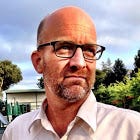#Back2School
My 1970’s #Back2School memories are filled with promises made by reams of blank pages in 3-ring binders, by aspirational personal planners, cornucopia pencil cases and perfect outfits laid out on my bed, one for each day of the first week. My #Back2School memories are not as infected as are the realities of my students.
Our charlatan president and his sycophantic orcs are demanding that we go #Back2School. And it is so much more difficult than that. More difficult than the protest sign taped to the inside of my rolled-up car window and tweeted, always tweeted. More difficult than “No”. More difficult than “Yes”. #Back2School is syncopation in the rhythm of my 55 years which I have come to understand as more river than lake; more breathing than breath.
What must it feel like to be a student in this disconnected dystopia. My goal as a teacher is for my students to make themselves free. To feel the ground solidly beneath their feet so that they can gain purchase, that they can push off, that they can, of their own volition, create momentum into a future created by them. Why does my vision for my students exist in a world without gravity? I imagine them, protected from their environment in space suits, and jet packs, navigating, maybe laughing.
America mythologizes teachers as heroes. On occasion one of us will inhabit an airbrushed movie script life; dodging bullets, braving disease, saving children, bringing-out-the-best-in-all-of-us. But this sort of heroism is small and meaningless. Teachers — who are humans — exist from birth to death connected to the lives of others, heroic only in aggregate, as are we all. The lie of the heroic teacher is that ‘hero’ is not in the job description. We are not designed to be heroic. We are only told about our ersatz heroism after the fact, when the story is useful, because stories are powerful and America’s dominant narrative always needs new lies.
And I want to be told that I am good. And I want to be a hero.
My classroom is intersectional across all the same characteristics as is my city, Oakland CA. Economics, gender, race, ethnicity, sexuality are all components of my students’ identity and layered onto that are the trauma and privilege of their differing life experiences. My job is to help them make themselves free within a structure that is designed at best for sustainable complacency and at worst, explicit and invidious oppression.
In Oakland we won’t literally be going back to school. We call what we are trying to do “distance learning”. 32 students at a time; their avatars lined up in a grid more oppressive even than desks in rows. I can mute my students by clicking on the screen that keeps me distant from them. I won’t know who they are on the first day. I don’t know how I will meet them. There are a few hundred students that my school can’t find.
There is a truth hidden inside the heat and noise of this incendiary moment. No aspect of school is maximized for the benefit of students. This #Back2School moment accepts the preposterous cost that at least a few thousand teachers and students will die; killed by this entirely avoidable circumstance. The orcs justify this cost with a kabuki of care for the same lives that they are cavalier about putting at risk. The orcs dissemble:
“These students need their teachers.”
“These students are struggling.”
“These students need to be in school.”
Even though their screeching, viscous, hypocritical laments for my students are cruel and duplicitous, they are right. Parents have lost their jobs or are essential workers and the pressure on families has increased from an already unbearable weight. The orcs are right. These students need to come back to school.
I refuse to be positive. I refuse to find a silver lining. I refuse to embrace this inhuman moment as an opportunity or a new normal. The craven aspirations of a few white men brought us here, brought us here with forethought and intention, dragged behind them, grist, fodder, flotsam. And I wonder, what if we refused. What if we stole their empty idea of American promise and filled it with us.
